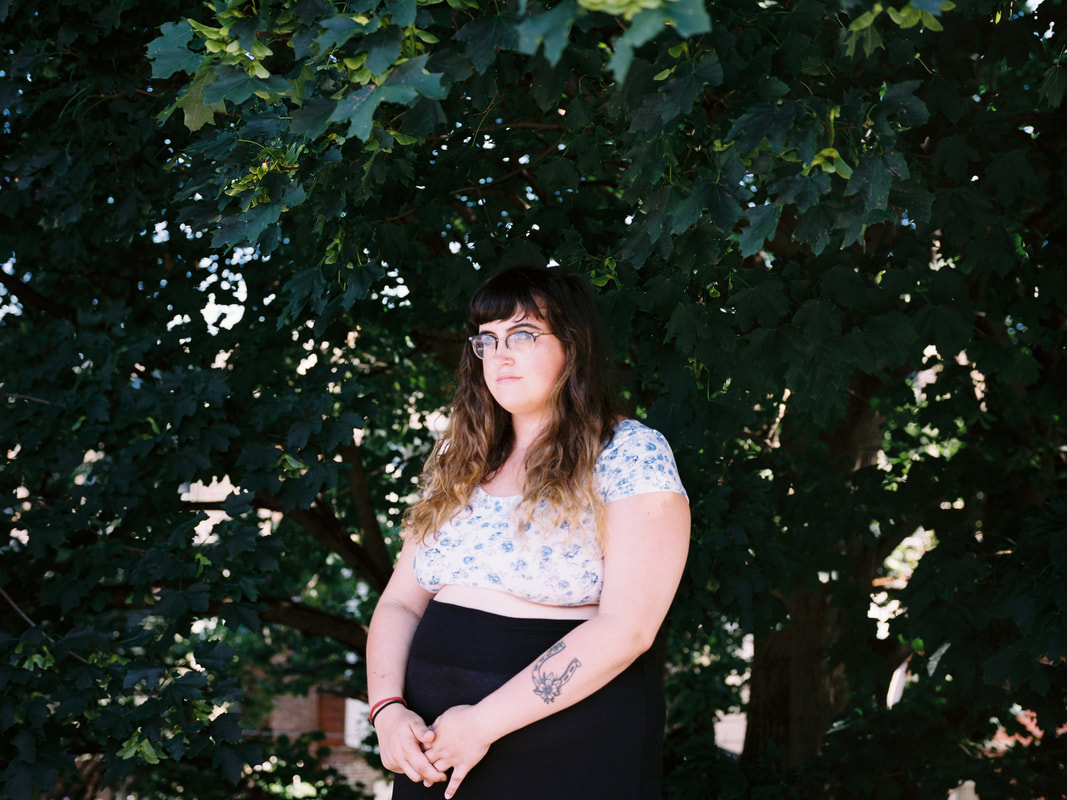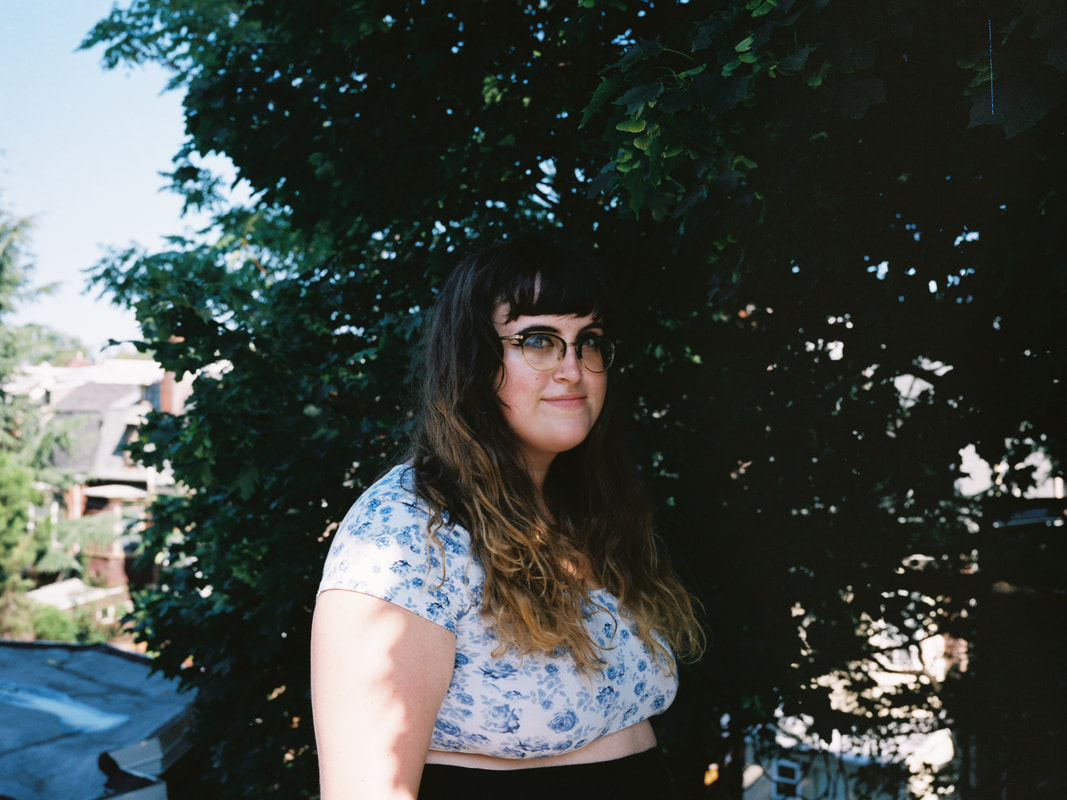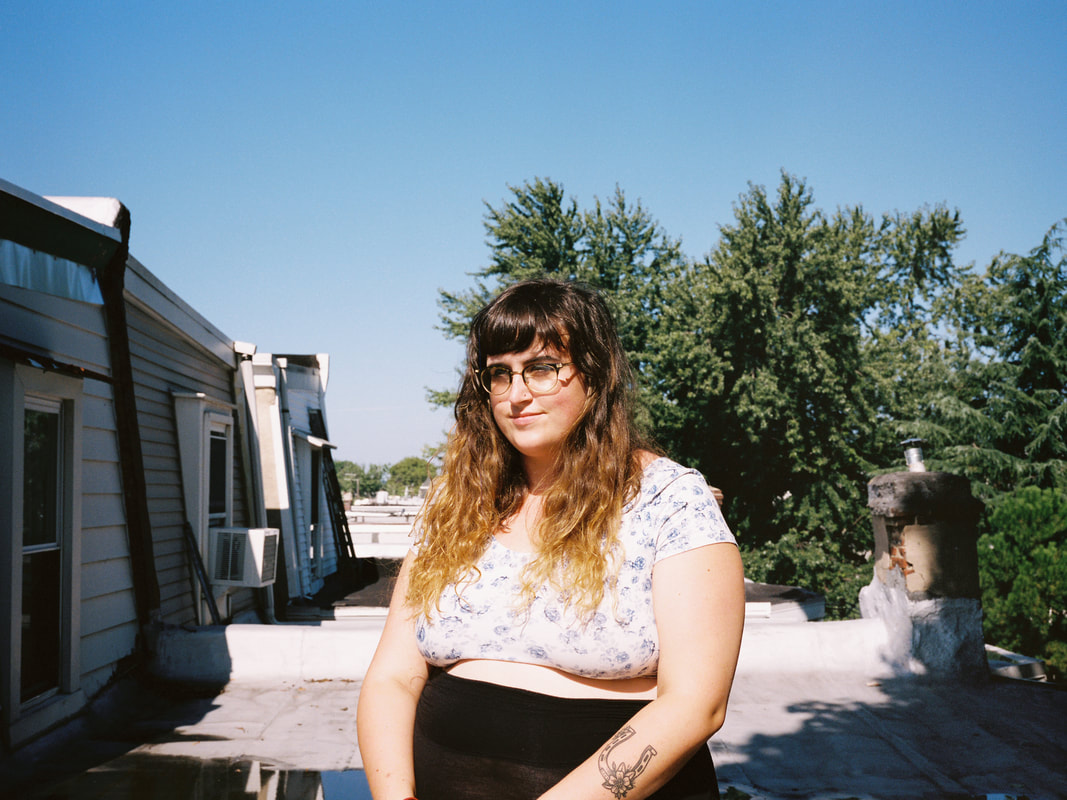|
Photos and interview by Terra Oliveira. Kate Foley is a 23 year old writer based in Easton, Pennsylvania. Recognized by the Academy of American Poets, her poetry has been featured in Thought Catalog, Voicemail Poems, The Legendary, Words Dance, and more. Her debut collection, The Bird Hours, was published by Where Are You Press in May 2017, and is now available on Amazon. She has performed in slams, speakeasies, and high school classrooms, among other places. She is the founder of Crooked Arrow Press, and is very excited for their inaugural issue to launch in January. Passionate about healing, dog kisses, and embroidery, she's here to help however possible. Hi Kate! We're incredibly honored to have you here. In what ways has writing been cathartic for you? In my experience, writing has been a restoration process. The creative journey I’ve taken has allowed me to transform myself from an aimless person into somebody with direction. Poetry is purposeful for me — not in a this will get published and I can advance in my career way, rather in a this will help me come to terms with my life and I can advance in my own self-growth way. Over the years, I’ve learned to harness suffering and turn it into art. For me, it’s all about channeling my feelings into something that I think is bigger than myself. Our own writing can be a powerful message for our future selves. I often find myself revisiting poems I wrote years ago to remind myself, "Yes, I've been through this before, so this I can overcome." Are there any poems of yours that help you recenter? That remind you of who you are, who/where you have been, and who you hope to grow into? With The Bird Hours specifically, “What We Lost in the Casino” comes to mind. Written about the first time I realized I had a drug problem, this poem keeps things real for me. I no longer need to compromise my values to be happy. Whenever I read or perform this piece, it cements in me the fact that I don’t have to go back there. Another poem that helps me recenter is “Seven Things I Need to Tell Myself to Make It Through the Day.” The mantras written in “Seven Things” are ones I forget pretty easily. You could argue I need this poem in order to continue healing from trauma. I’m grateful the past version of myself is consistently looking out for current me. What does your self-care practice look like to you? What’s magical about self-care is that it looks different for everyone. Sometimes, for me, it means wiping off the residue of my makeup from the previous day or only leaving the house to buy cigarettes. Self-care is survival and surviving is not easy for everyone. When taking a shower becomes a victory, it doesn’t always feel like a triumph. But when the basic things become a struggle I know I have to treat myself with nothing but tenderness. I deserve to love myself. I deserve to make it through another day. I deserve to stay. How has community been important to you? After my most recent sexual assault, I was afraid to go about my daily life because my rapist knew where I lived, where I worked, where I went to my support group. I shared with my friends what I was going through and the support I received really came to the forefront. People let me crash on their couches and cry on their balconies. They drove me to the ER to get a rape kit. They picked me up from the police station. My friends showed up when I needed them. It dawned on me that I have several beautiful circles filled with love and care. I felt listened to, supported, and believed. Without community, I would have been more lost than I already was. Who are some of your influences, both creative and otherwise? What about them resonates with you? My friend Christopher and I were discussing gateway poets the other night. We asked each other what writer ignited our own craft from the start. The first person that came to mind was Andrea Gibson. I remember someone showing me a YouTube video of Andrea reading Maybe I Need You sometime in high school. Hearing their words resonated with me because it just seemed like Andrea felt everything so deeply. I could identify with that. I’ve always felt my feelings loudly. Other creative influences of mine include Megan Falley, Amy Winehouse, Cat Power — anyone who can spin their emotions into words because that’s always what I’ve aspired to do. It’s what I try to do on the regular. On top of being a writer, you're also a spoken word performer. How does sharing these vulnerable pieces of yourself in physical spaces differ from sharing your work in print? Speaking my poems aloud is like a therapy session but with a whole crowd of people. Although I’m grateful to have my work in print, especially as it is more accessible for others, sharing my work in a public space allows me to find a sort of solidarity that I wouldn’t otherwise have. Having venues such as open mics and slams allows me to confront my past while also valuing the present moment. I think life gets a lot easier when you don’t have any secrets. I do my best to live up to that philosophy. You recently launched Crooked Arrow Press, a new publishing press "which explores movement and passion and art." Can you tell us a little bit about the meaning behind the name, and the vision for the press? Arrows are typically straight and fly in a steady direction. The concept of a crooked arrow hit me. If it was crooked, the arrow would still probably shoot forward, just not linearly. Life isn’t linear. There are bumps, falls, hiccups. I like to believe that it’s okay to struggle, so long as you struggle forward. Crooked arrows do this. My hope with Crooked Arrow Press is that we can give a platform to poets through two themed online anthologies a year. We eventually hope to make the jump to print. On a more emotional level though, the vision is that the writers published in Crooked Arrow will represent the radical act of movement. The first issue you will be releasing through Crooked Arrow Press is centered around the theme of platonic love poems. For me, the unending support of friendship has played a key role in finding the confidence in my voice and belief in my life-path, though I've only recently learned how to pour as much love into my friendships, work, and self as I used to solely pour into partners. How has platonic love been important to you? How a stranger becomes an acquaintance becomes a friend is totally mystical to me. I find strength in these bonds because, ultimately, these people I choose to have in my life provide a level of comfort I haven’t found anywhere else. There is pure encouragement, pure support. It’s a sort of love where you want to see each other grow. I’d even argue that you can find the same butterfly moments as you did with romantic love. Friends are precious. In The Bird Hours, you boldly share your experiences with mental illness, addiction, and recovery. Healing often feels like an ongoing process that constantly demands we dive into ourselves, untangling the pieces that draw us to certain habits, behaviors, and conditioned responses to our environments. How do you define healing? And how do you hold space for yourself when healing doesn't look the way others expect it to be? Honestly, healing can be exhausting. That doesn’t mean it’s not worth it. What’s interesting about healing is that there’s no official final goal. If there was, it would be to just live. Healing means life and I like being alive. Although, it’s up for interpretation for everyone, which is really appropriate given that everyone is healing from different things. I hold space for myself when my process is looked down on by allowing myself to feel things fully and by reminding myself that there is no perfect way to get better. In what ways do you hope The Bird Hours will speak to those facing an active addiction, and to those in recovery? I hope that addicts who read my work can identify with the story I’ve told. The Bird Hours has taken on a new meaning to me since its publication in May. My collection gives me courage, strength, and hope. My biggest dream is that it can do the same for anyone in active addiction or recovery. I hope The Bird Hours can encourage other addicts to share their stories as well. In what ways do you hope The Bird Hours will speak to those who have loved ones facing an active addiction, and with loved ones in recovery? It would be incredible if The Bird Hours offered loved ones a new perspective. I think of poems like “Hard News” and “If My Brother Was a Writer.” My hope is that a friend or family member of an addict can get a better understanding of what runs through the addictive mind. However, I don’t want to be a spokesperson for addiction, so a bigger and more realistic hope of mine is that an open dialogue can ignite between the loved one and the addict. It would be so cool if my work could inspire that. If you were to write a letter to your past self 3 years ago, what would you say to her? Sadness will come again. Don’t fight it. Allow yourself to feel. Know that with every ache, there will come something more bright and more powerful. There will be days where you think the best thing is the worst thing and you’re entitled to feel that way. Keep making mistakes. Keep writing. Keep being. And remember, pain is necessary because what else is there to move on from?
1 Comment
6/24/2020 07:49:51 pm
Poetry is a form of literature that is based on the interplay of words and rhythm to evoke a concentrated imaginative awareness of an experience or emotion. To put it simply, poems are products of artistic writing that aim to stir the imagination and emotions of people. Aside from being a form of literary art, poetry is also a therapeutic platform. It has a healing power that can make people feel better mentally and emotionally.
Reply
Leave a Reply. |



